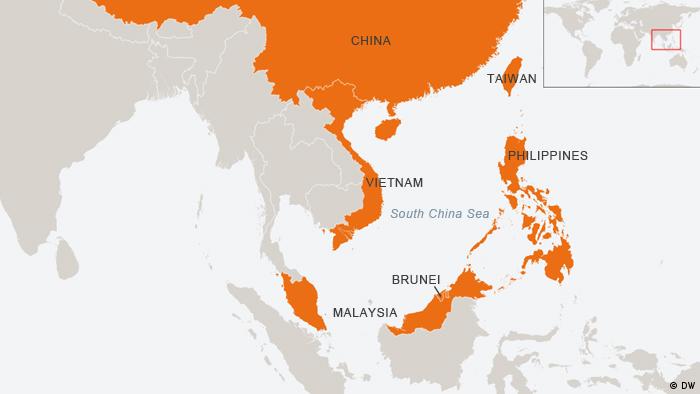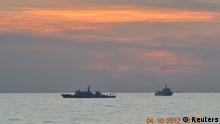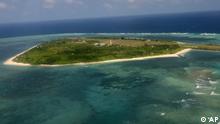
An International Crisis Group report blames Chinese structures
for the failure to resolve South China Sea dispute. It adds that
regional nationalism is exacerbating the tension.
The territorial dispute over the islands, atolls, shoals, reefs and
sandbars of the South China Sea goes back decades. Even though most of
the islands are uninhabited, the region, which straddles several key
shipping lanes, is thought to be extremely rich in natural resources.
In 2009, tension rose again when Beijing presented a "nine-dotted line" (also known as the "U-shaped line" or "nine-dash map"), to the UN to officially lay claim to the region. Chinese sources say the document dates back to 1947. Vietnam, Malaysia and Indonesia officially registered their protest.
 The US and Vietnamese navies launched joint maneuvers on Monday
Stefan Talmon, the co-director of the Public International Law
Institute at the University of Bonn, told DW that there was no evidence
for the veracity of the line and China would have to prove it had always
had effective and undisputed control of the region. "That would be very
difficult," he said, adding that the only solution would be found
through negotiations.
The US and Vietnamese navies launched joint maneuvers on Monday
Stefan Talmon, the co-director of the Public International Law
Institute at the University of Bonn, told DW that there was no evidence
for the veracity of the line and China would have to prove it had always
had effective and undisputed control of the region. "That would be very
difficult," he said, adding that the only solution would be found
through negotiations.
Conflicting Chinese agencies
In a report published on Monday (23.04.2012), International Crisis Group (ICG) warned that the territorial disputes could be further fuelled by a lack of coordination among Chinese government agencies and the rise of nationalism.
"Chinese government structures are not well suited to dealing with the conflict in the South China Sea," said Stephanie Kleine-Ahlbrandt, the head of the ICG's Beijing office.
More than 11 ministry-level government agencies and five law enforcement agencies are currently involved in the management in the South China Sea.
 Tension flared between China and the Philippines in April
"While some agencies act aggressively to compete with one another for
a greater portion of the budget pie, others (primarily local
governments) attempt to expand their economic activities in disputed
areas due to their single-minded focus on economic growth," the report
states.
Tension flared between China and the Philippines in April
"While some agencies act aggressively to compete with one another for
a greater portion of the budget pie, others (primarily local
governments) attempt to expand their economic activities in disputed
areas due to their single-minded focus on economic growth," the report
states.
Moreover, China's navy has also "used maritime disputes to justify its modernization," further compounding the problem.
"The system in China is so decentralized that local actors are encouraged to only pursue economic or political interests. The actors do not realize the international implications of their actions," said Kleine-Ahlbrandt.
Rising nationalism
Kleine-Ahlbrandt pointed out that China had spoiled its chances of building up a relationship based on trust with other states in the region, which had thus turned to the US for support. The Philippines and Vietnam, for example, have further developed their military ties with the US - on Monday, Vietnam kicked off a weeklong naval exchange with the US, amid criticism from Beijing.
 Most of the disputed islands are uninhabited
"Nationalism not only makes it difficult for a solution to be found
regarding sovereignty in the South China Sea but also to prevent small
incidents from escalating," said Kleine-Ahlbrandt.
Most of the disputed islands are uninhabited
"Nationalism not only makes it difficult for a solution to be found
regarding sovereignty in the South China Sea but also to prevent small
incidents from escalating," said Kleine-Ahlbrandt.
Philippine and Chinese patrol vessels are currently locked in a 14-day stand-off at a shoal in the South China Sea, which is within the Philippines' 200-nautical-mile (370-kilometer) exclusive economic zone that is also claimed by China. The standoff began when two Chinese navy surveillance vessels blocked a Philippine warship from arresting the crew of eight Chinese fishing boats accused of poaching.
International Crisis Group calls on Beijing in its report to come up with a consistent policy.
"The escalating tensions since 2009 have dealt a severe blow to Beijing's relationships with the Southeast Asian neighbors and gravely tarnished its image both regionally and internationally."
Author: Rodion Ebbighausen / act (AP, dpa)
Editor: Sarah Berning
In 2009, tension rose again when Beijing presented a "nine-dotted line" (also known as the "U-shaped line" or "nine-dash map"), to the UN to officially lay claim to the region. Chinese sources say the document dates back to 1947. Vietnam, Malaysia and Indonesia officially registered their protest.
 The US and Vietnamese navies launched joint maneuvers on Monday
The US and Vietnamese navies launched joint maneuvers on MondayConflicting Chinese agencies
In a report published on Monday (23.04.2012), International Crisis Group (ICG) warned that the territorial disputes could be further fuelled by a lack of coordination among Chinese government agencies and the rise of nationalism.
"Chinese government structures are not well suited to dealing with the conflict in the South China Sea," said Stephanie Kleine-Ahlbrandt, the head of the ICG's Beijing office.
More than 11 ministry-level government agencies and five law enforcement agencies are currently involved in the management in the South China Sea.
 Tension flared between China and the Philippines in April
Tension flared between China and the Philippines in AprilMoreover, China's navy has also "used maritime disputes to justify its modernization," further compounding the problem.
"The system in China is so decentralized that local actors are encouraged to only pursue economic or political interests. The actors do not realize the international implications of their actions," said Kleine-Ahlbrandt.
Rising nationalism
Kleine-Ahlbrandt pointed out that China had spoiled its chances of building up a relationship based on trust with other states in the region, which had thus turned to the US for support. The Philippines and Vietnam, for example, have further developed their military ties with the US - on Monday, Vietnam kicked off a weeklong naval exchange with the US, amid criticism from Beijing.
 Most of the disputed islands are uninhabited
Most of the disputed islands are uninhabitedPhilippine and Chinese patrol vessels are currently locked in a 14-day stand-off at a shoal in the South China Sea, which is within the Philippines' 200-nautical-mile (370-kilometer) exclusive economic zone that is also claimed by China. The standoff began when two Chinese navy surveillance vessels blocked a Philippine warship from arresting the crew of eight Chinese fishing boats accused of poaching.
International Crisis Group calls on Beijing in its report to come up with a consistent policy.
"The escalating tensions since 2009 have dealt a severe blow to Beijing's relationships with the Southeast Asian neighbors and gravely tarnished its image both regionally and internationally."
Author: Rodion Ebbighausen / act (AP, dpa)
Editor: Sarah Berning
No comments:
Post a Comment